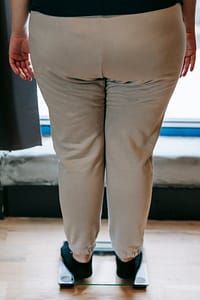Understanding Menopause Health Risks
Navigating menopause, you may encounter health challenges. Understanding these is key to managing your health. What is the major health problem in menopause? This is the first question you need to address.
Impact of Estrogen Decline
The most pronounced health problem during menopause is the decline in estrogen levels. Estrogen, a hormone that regulates many functions in your body, decreases significantly during menopause. This drop in estrogen can lead to various symptoms, including vaginal dryness, hot flashes, night sweats, and a decrease in sexual desire. These effects are part of the natural transition but can significantly impact your quality of life (Menopause.org).
Beyond the immediate symptoms, the decline in estrogen also contributes to longer-term health risks. Estrogen plays a role in maintaining bone density; its decrease can lead to an increased risk of osteoporosis and bone fractures. Moreover, estrogen helps to keep the lining of the blood vessels flexible, meaning its reduction can impact cardiovascular health.
Common Health Issues
Two of the most critical health concerns associated with menopause are osteoporosis and coronary artery disease.
- Osteoporosis: During menopause, you may lose an average of 25% of your bone mass from the onset of menopause to age 60 due to the loss of estrogen. Bone mineral density (BMD) testing is vital for detecting osteoporosis and its precursor, osteopenia (Cleveland Clinic).
- Coronary Artery Disease: After menopause, the risk of coronary artery disease increases. This condition involves the narrowing or blockage of the arteries that supply blood to the heart muscle, which can lead to serious heart complications (Cleveland Clinic).
Additionally, hormone therapy, often prescribed to relieve menopausal symptoms such as hot flashes and to prevent osteoporosis, has its own set of health risks, including an increased risk of blood clots, stroke, and breast cancer.
Emotional well-being is another area impacted by menopause. Mood swings, anxiety, and fear are common, and the extreme shifts in hormone levels, coupled with sleep disturbances and other physical symptoms, can sometimes contribute to depression.
It is essential to discuss your symptoms and risks with your healthcare provider. Understanding what makes menopause worse can help you take proactive steps in managing your health. Moreover, exploring what really helps with menopause? and adopting healthy habits during menopause can significantly improve your experience during this transition. For a comprehensive list of common complaints during menopause and advice on what to avoid during menopause, refer to our detailed guides. To stay positive and active, consider engaging in the best activities during menopause and learn more about the mental health aspects of menopause. For those seeking non-pharmaceutical options, investigate natural remedies for menopause.
Managing Osteoporosis Risk
Navigating the changes your body endures during menopause can be challenging, particularly when it comes to the risk of osteoporosis—a condition characterized by weakened bones and an increased risk of fractures. Understanding how menopause affects bone density and what preventive measures you can take is crucial for your long-term health.
Bone Density and Menopause
As you transition through menopause, the decline in estrogen levels significantly impacts your bones. Estrogen plays a key role in maintaining bone density, and with its decrease, you may experience accelerated bone loss. This can leave your bones fragile and more susceptible to fractures.
Studies show that individuals can lose an average of 25% of their bone mass from menopause to age 60 due to the loss of estrogen (Cleveland Clinic). Further research indicates that up to 20% of bone loss can occur during menopause, with approximately 1 in 10 women over the age of 60 affected by osteoporosis globally (Endocrine Society).
One in two postmenopausal women will develop osteoporosis, and most will suffer a fracture during their lifetime. These fractures can lead to pain, decreased mobility and function, and a diminished quality of life.
To monitor your bone health, consider undergoing bone mineral density testing. This can detect osteoporosis and osteopenia, which is a precursor to osteoporosis, allowing for early intervention.
Preventive Measures
Taking proactive steps to manage your osteoporosis risk is key. Here are some preventive measures you can implement:
- Calcium and Vitamin D: Ensure you’re getting enough calcium and vitamin D, which are vital for bone health. Leafy greens, dairy products, and certain fish are excellent sources of calcium, while vitamin D can be synthesized from sunlight exposure and found in fortified foods and supplements.
- Regular Exercise: Engage in weight-bearing and muscle-strengthening exercises. Activities like walking, dancing, or lifting weights can help maintain bone density.
- Healthy Habits: Avoid smoking and limit alcohol consumption, as these can exacerbate bone loss. Discover more about healthy habits for menopause.
- Medications: Speak with your healthcare provider about medications that can help prevent bone loss and reduce fracture risk.
- Lifestyle Modifications: Explore lifestyle changes for menopause that can assist with overall well-being, including stress management and a balanced diet.
By understanding the connection between bone density and menopause, and by taking preventive measures, you can help mitigate the risk of osteoporosis. It’s important to consult with your healthcare provider to develop a personalized plan that addresses your specific needs and concerns. For more information on coping with menopausal symptoms and enhancing your quality of life, visit our guide on what really helps with menopause.
Addressing Cardiovascular Concerns
As you navigate through menopause, understanding the implications it has on your heart health is crucial. Estrogen’s decline during menopause is linked to an increased risk of cardiovascular diseases (CVD), which are the leading cause of death in women post-menopause. Let’s delve into the risk factors and protective measures you can take to safeguard your heart health during this transitional period.
Heart Disease Risk Factors
The decline of estrogen, particularly estradiol (E2), during menopause is a significant factor in the increased risk of heart disease in women. Estrogen is known for its protective mechanisms against CVD, such as enhancing blood vessel function, reducing oxidative stress, and limiting heart remodeling (NCBI). With the onset of menopause, you may also experience unfavorable changes in your lipid profile, including increased levels of LDL-C (low-density lipoprotein cholesterol), total cholesterol, and triglycerides, which further contribute to the risk of heart diseases (NCBI).
Here is a summary of the cardiovascular risk factors exacerbated by menopause:
- Decline in protective estrogen levels
- Increase in LDL-C and total cholesterol
- Rise in triglycerides
- Higher incidence of coronary artery disease
Understanding these risk factors is the first step in taking proactive measures to protect your heart. To learn more about the implications of menopause on your overall health, explore Health problems menopause
Cardiovascular Protection
Protecting your heart during menopause involves a holistic approach that includes lifestyle changes and, in some cases, medical interventions. Research by the American Heart Association News suggests that the most effective ways to prevent heart disease include:
- Avoiding smoking
- Engaging in physical activity
- Eating a heart-healthy diet
- Maintaining a healthy weight
- Ensuring adequate sleep
- Managing cholesterol, blood pressure, and blood glucose levels
Increasing physical activity is particularly beneficial, as it contributes to cardiovascular fitness and overall well-being. Additionally, lipid-lowering medications, such as statins, may be recommended to manage cholesterol levels and reduce the risk of CVD regardless of gender and menopausal status (NCBI). It’s important to consult with your healthcare provider to determine the best course of action for your specific situation.
Incorporating healthy habits during menopause can make a significant difference to your heart health. Regular check-ups with your healthcare provider to monitor your cardiovascular risk factors, coupled with the lifestyle adjustments mentioned, can help you maintain a healthy heart during and after the menopausal transition. For more guidance on managing menopausal symptoms and improving your quality of life during this phase, check out what really helps with menopause? and what are five lifestyle changes that can assist with menopause?
Taking these proactive steps can significantly reduce your risk of cardiovascular diseases and enable you to enjoy a healthier, more vibrant life during and after menopause.
Coping with Menopausal Symptoms
Navigating the transition to menopause can be challenging due to a variety of physiological changes and symptoms. Understanding these changes and implementing lifestyle adjustments are key to managing this phase of life effectively.
Emotional Changes
During menopause, you may experience emotional changes such as mood swings, anxiety, and fear. These feelings can sometimes contribute to depression. The Cleveland Clinic notes that extreme shifts in hormone levels, sleep disturbances, and other symptoms of menopause can impact your emotional well-being. It is essential to recognize these changes and seek support when needed.
- Mood swings
- Anxiety
- Fear
- Possible depression
To help manage these emotional shifts, consider the following strategies:
- Stay Connected: Maintain social contacts and share your experiences with friends or support groups.
- Mindfulness Practices: Engage in activities such as yoga or meditation to help stabilize your mood.
- Professional Support: If you’re struggling, don’t hesitate to consult a healthcare provider or therapist.
For a deeper understanding of the mental changes that occur during menopause, read about what happens to a woman’s mind during menopause?.
Lifestyle Adjustments
Lifestyle adjustments can play a significant role in managing menopausal symptoms. Here are some changes that can assist you during this transition (American Heart Association News):
- Healthy Eating: Focus on a balanced diet rich in fruits, vegetables, whole grains, and lean proteins.
- Regular Exercise: Incorporate activities like walking, swimming, or cycling to help manage weight and improve mood.
- Proper Sleep: Aim for 7-8 hours of quality sleep each night to reduce fatigue and mood swings.
- Stress Reduction: Techniques such as deep breathing or progressive muscle relaxation can help reduce stress levels.
For more detailed advice on lifestyle changes, explore what are five lifestyle changes that can assist with menopause?.
In addition to these strategies, it’s vital to be aware of what could exacerbate menopausal symptoms. Certain foods and habits may trigger or worsen your symptoms. For guidance on what to avoid, check out what should you not do during menopause?.
By making informed lifestyle adjustments, you can mitigate many of the common complaints of menopause. Learn more about what really helps with menopause by visiting what really helps with menopause?, and discover what are the healthy habits of menopause? to foster overall well-being. If you’re interested in natural remedies, find out what is the best natural for menopause.
Remember, you’re not alone in this journey. Many women find that with the right support and changes, they can embrace this new chapter in life with confidence and good health.
No content on this site, regardless of the posting date, should be used as a substitute for direct medical advice from your doctor or another qualified healthcare professional.
This website may contain affiliate links, and we may earn a commission for any purchases you make on affiliate websites using these links. Our affiliates include Clickbank. Rest assured, these affiliate links come at no additional cost to you.


